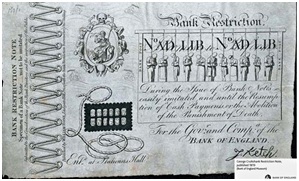 Letters written by or on behalf of prisoners convicted of forging bank notes in the late 18th and 19th century have neen released by the Bank of England and these letters portray a heartbreaking picture of those awaiting death or exile to Australia. Forgery and the circulation of counterfeit notes were crimes punishable by death, while those in possession of forged notes faced sea transportation to New South Wales. The letters of pleas for help and charity by prisoners in jails across England or on prison ships, written to their prosecutors are held at the Bank of England’s archive and have been published on its website. The bank is in the process of releasing its historic archive documents and making them available online. Recently, some correspondence was found in the archives that hints at a closer relationship between the bank and Lawrence of Arabia than anyone had suspected. One female prisoner in London, a 34-year-old mother of nine, Sarah Whiley, wrote to request a ‘small trifle’ from ‘the Honourable Gentlemen’ of the bank, so she might buy some tea and sugar for her sea voyage. “Receive the contrition of an unfortunate woman … have compassion on a deluded and misguided female … for I was prey to delusive and false persons … I am well aware of your goodness towards the unfortunate,” she wrote. The Bank sent £5, at the time a very generous sum, “for small necessaries … most likely to contribute to her comfort” for her six-month sea voyage to New South Wales to serve a life sentence in exile. The surge in counterfeit notes came after the Napoleonic wars when the bank was no longer able to pay out gold in exchange for bank notes. For the first time, low denomination £1 and £2 notes were issued in 1797, with many soon being forged and circulated across the country. After more than 300 people had been hanged for forgery, the Bank’s solicitors, Freshfields, drafted a bill that became law in May 1801 and offered those convicted the option of a “plea bargain”. This gave a prisoner the option of pleading guilty to being in possession of counterfeit notes – in return for punishment of 14 years’ transportation. In their responses to the hundreds of letters they received, the bank’s directors showed themselves generous and charitable to prisoners, in particular mothers and the children in jail with them, whereas men fared less well.
Letters written by or on behalf of prisoners convicted of forging bank notes in the late 18th and 19th century have neen released by the Bank of England and these letters portray a heartbreaking picture of those awaiting death or exile to Australia. Forgery and the circulation of counterfeit notes were crimes punishable by death, while those in possession of forged notes faced sea transportation to New South Wales. The letters of pleas for help and charity by prisoners in jails across England or on prison ships, written to their prosecutors are held at the Bank of England’s archive and have been published on its website. The bank is in the process of releasing its historic archive documents and making them available online. Recently, some correspondence was found in the archives that hints at a closer relationship between the bank and Lawrence of Arabia than anyone had suspected. One female prisoner in London, a 34-year-old mother of nine, Sarah Whiley, wrote to request a ‘small trifle’ from ‘the Honourable Gentlemen’ of the bank, so she might buy some tea and sugar for her sea voyage. “Receive the contrition of an unfortunate woman … have compassion on a deluded and misguided female … for I was prey to delusive and false persons … I am well aware of your goodness towards the unfortunate,” she wrote. The Bank sent £5, at the time a very generous sum, “for small necessaries … most likely to contribute to her comfort” for her six-month sea voyage to New South Wales to serve a life sentence in exile. The surge in counterfeit notes came after the Napoleonic wars when the bank was no longer able to pay out gold in exchange for bank notes. For the first time, low denomination £1 and £2 notes were issued in 1797, with many soon being forged and circulated across the country. After more than 300 people had been hanged for forgery, the Bank’s solicitors, Freshfields, drafted a bill that became law in May 1801 and offered those convicted the option of a “plea bargain”. This gave a prisoner the option of pleading guilty to being in possession of counterfeit notes – in return for punishment of 14 years’ transportation. In their responses to the hundreds of letters they received, the bank’s directors showed themselves generous and charitable to prisoners, in particular mothers and the children in jail with them, whereas men fared less well.
